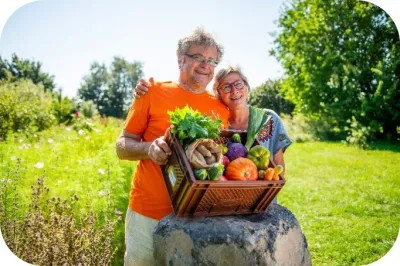Summary
Entdecken Sie, wie der österreichische Bio-Bauernhof Adamah BioHof nachhaltige Logistik mit Direktvertrieb kombiniert, um die Rentabilität zu steigern, den Marktzugang zu verbessern und engere Beziehungen zu den Verbrauchern aufzubauen. Ein eindrucksvolles Beispiel dafür, wie innovative Strategien für die Lieferkette die Wettbewerbsfähigkeit steigern und gleichzeitig Nachhaltigkeitsziele unterstützen können.
Die Förderung von Innovationen in der nachhaltigen Logistik, der Direktverkauf und die Verkürzung der Wege zum Verbraucher in der Lieferkette können die Rentabilität der Landwirte steigern und neue Vermarktungsmöglichkeiten eröffnen. Adamah BioHof ist ein familiengeführter Bio-Bauernhof etwas außerhalb von Wien, Österreich, der auf einer Fläche von 100 Hektar eine Vielzahl von Wurzelgemüse, Obst, Kräutern und Getreide anbaut. Der Hof ist ein Paradebeispiel dafür, wie Landwirte von nachhaltiger Logistik und Direktvermarktung profitieren können, um ihren Marktzugang, ihre Wettbewerbsfähigkeit und ihre Rentabilität zu verbessern und gleichzeitig Nachhaltigkeitsziele zu erreichen.
Angetrieben von einem starken Engagement ist der Betrieb mit seinem Online-Shop, über den er Bio-Produkte direkt an Verbraucher verkauft und traditionelle Zwischenhändler im Einzelhandel umgeht, ein Vorbild für andere Landwirte. Neben den eigenen Bio-Produkten bietet er auch eine breite Palette von Bio-Produkten anderer Landwirte und Produzenten aus der Region und Österreichs sowie international bezogene Produkte an. Durch diese Zusammenarbeit kann er ein Vollsortiment von über 2.500 Bio-Produkten anbieten.
Über ihren Lieferservice „BioKistl“ (Bio-Kisten) beliefert der BioHof wöchentlich rund 6.500 Haushalte sowie lokale Restaurants, Bistros und Bioläden in Wien und Umgebung mit Bio-Produkten.
Durch den Vertrieb von Bio-Produkten über den Online-Shop unseres BioHofs und die Lieferung nach Hause erreichen wir einen größeren Kundenkreis und steigern unsere Einkommensmöglichkeiten.
Der Adamah BioHof dient als Vorbild für andere Höfe, die ein erfolgreiches, nachhaltiges Logistiksystem aufbauen möchten, dessen Schwerpunkt auf dem Direktverkauf liegt. Durch die tägliche Ernte frischer Produkte und die Lagerung langlebiger Erzeugnisse in CO₂-neutralen, solarbetriebenen Kühlanlagen reduziert der Hof sowohl Abfall als auch Treibhausgasemissionen erheblich. Spezielle Kühlfahrzeuge in Kombination mit Fahrradkurieren in städtischen Gebieten ermöglichen eine effiziente Umsetzung mit minimalen Umweltauswirkungen, wodurch unnötige Kilometer vermieden und die logistische Effizienz insgesamt gesteigert werden. Dieser integrierte Ansatz zeigt, wie Landwirte den Wert ihrer Produkte steigern und gleichzeitig ihren CO₂-Fußabdruck verringern können.
Hintergrundinformationen
Vom 20. bis 21. Mai 2025 organisierte das EU-GAP-Netzwerk in Rouen (Frankreich) einen Workshop zum Thema „Innovation in der Logistik zur Verbesserung der Position von Landwirten in der Lieferkette”. Ziel des Workshops war es, innovative Praktiken, neue Ansätze und neue organisatorische oder technologische Lösungen zu untersuchen, mit denen die Logistik in der Lieferkette für einzelne landwirtschaftliche Betriebe, Erzeugergemeinschaften und Genossenschaften optimiert werden kann.
Gerhard Zoubek


